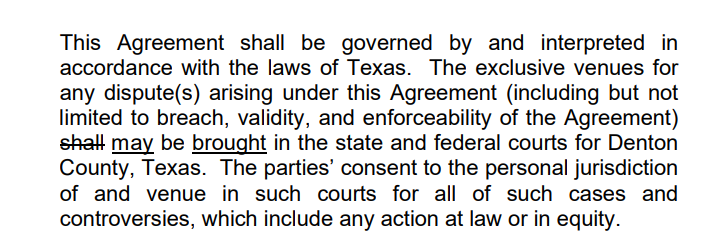Is a Forum Selection Clause Mandatory When It Says Both “Exclusive” and “May Be Brought in…”? (Ecovirux, LLC v. Biolpedge)
- By : Cbh
- Category : Clauses from Contracts

The parties negotiated a contract and, in the final form, the forum selection clause read as follows:

The debate over whether this clause was PERMISSIVE or MANDATORY came down to a question whether the phrase “exclusive venue” controlled over “may be brought in…” Other issues were whether this was a patent or latent ambiguity or simply a failure of the meeting of the minds.
Florida’s Third District Court of Appeal set out these principles to interpret the forum selection clause:
- Absent a latent ambiguity—as distinct from a patent ambiguity—the
determination as to whether a clause is mandatory or permissive is a matter
of pure contractual interpretation - Clauses containing language of exclusivity are construed as mandatory
- No “magic words” are required, but the language employed must evince the parties’ clear intent to limit venue
- In the absence of such language, a clause is deemed permissive
With those rules in mind, the Court held:
- Courts have consistently construed clauses containing the word “exclusive” and its variants as mandatory
- Divorced from its contractual context, the phrase “may be brought” could indeed be interpreted as permissive. It is well-settled, however, that words and phrases in a contract cannot be considered in isolation
- The phrase “may be brought” does not detract from this expressed intention. Instead, the clause simply states the obvious. No aggrieved party is compelled to file suit to resolve a given dispute. If the party elects to do so, however, suit is proper only in either the state or federal courts of Denton County, Texas
The November 2022 opinion in Ecovirux, LLC v. Biolpedge is here.
What is the lesson?
Read your contracts carefully for limitations of liability, jury waivers, arbitration clauses, and venue/jurisdiction clauses. Are they current and enforceable? Ideally, your contract language should follow clauses which have been enforced by the appellate court in your jurisdiction. This will increase your chances of enforcing your contract and reduce your expenses in doing so.
Make sure you hire a knowledgeable lawyer in your jurisdiction who has experience writing and litigating these types of clauses. Depending on the length of your contracts, it should only cost in the hundreds of dollars to get your contract forms in shape.
Image credit: Aksonsat Uanthoeng on Pexel


